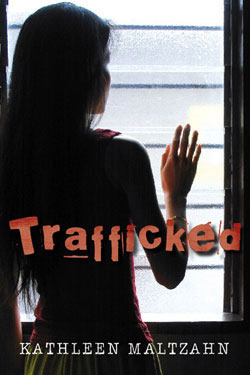
Similarly, Australia’s current anti–trafficking laws fail to recognise that women may be subject to forms of coercion subtler — but no less powerful — than being chained to a bed.
The UN Protocol definition of trafficking includes the “threat or use of force or other forms of coercion, of abduction, of fraud, of deception, of the abuse of power or of a position of vulnerability or of the giving or receiving of payments or benefits to achieve the consent of a person having control over another person” (my italics).
In Australia, before the introduction of the Criminal Code Amendment (Trafficking in Persons Offences) Act 2005, trafficking of women was tried under the Criminal Code Amendment (Slavery and Sexual Servitude) Act 1999.
The 1999 legislation included three broad crimes – slavery, sexual servitude and deceptive recruiting. It was a clunky piece of legislation which fell short of responding to the situations women actually found themselves in. Its usefulness could be measured in part by how often it had been used. Between 1999 when it was introduced, and 2003 when trafficking hit national newspapers, there was not one prosecution under the Act.
The extent to which misunderstandings of trafficked women’s experiences of sexual slavery were impeding successful prosecutions was made clear to me at an event which took place before the introduction of the 2005 legislation.
I had been invited by the Australian Federal Police (AFP) to present at a one–day conference for Commonwealth investigators, covering a number of departments, including the AFP, the Australian Taxation Office and the Director of Public Prosecutions (DPP). I did my usual presentation on trafficking, pointing out the ways in which threats and violence were used to shackle women, and saying I had never, in all my time working on trafficking, heard of women being, say, chained to the bed.
After my talk, a lawyer with the DPP came up to me. She was interested in my presentation, she said, because the DPP had just been given a sexual slavery case and none of them could see how it could be a crime, because the women hadn’t been physically restrained. It was a dismaying discovery, but one that explained the initial weakness of the DPP’s approach to the case.
Unfortunately, unlike the AFP, the DPP at that point had done little to learn about trafficking, and their understanding of slavery meant that they couldn’t recognise the women’s experiences within that paradigm. Given this ignorance on the part of the people prosecuting the cases, combined with the community’s lack of exposure to trafficking in Australia, it wasn’t surprising how few slavery offences were prosecuted.
In contrast to the slavery offence, with its high level of proof, the 1999 legislation included a theoretically more useable offence of deceptive recruiting. But this offence had a different but equally frustrating limitation. Deceptive recruiting covered only the type of work that women were being recruited for, not its nature. It captured the minority of women who were duped about the fact they were entering prostitution, but not the majority who consented to enter the sex industry but were deceived about the conditions they would work under.
Prostitutes who were told they would be free to do as they wanted, would be working legally and would earn decent money were not seen to have been deceptively recruited. It fell, again, into the old model of “good” victims and “bad” victims, virtuous women forced into prostitution and so worthy of state protection, and gullible prostitutes who should have known what they had coming.
In September 2004, honouring its 2003 promise to “comprehensively criminalise trafficking activity” and in recognition of the unworkable nature of the existing legislation, the Government released an exposure draft of its proposed new trafficking legislation which, after significant reworking in the committee process, was finally passed in June 2005. The Criminal Code Amendment (Trafficking in Persons Offences) Act 2005 was an important improvement on the 1999 legislation. It is a comprehensive piece of legislation that has been used effectively to prosecute traffickers and, one hopes, get some justice for trafficked women.
The AFP says that since January 2004 its Transnational Sexual Exploitation and Trafficking teams have undertaken more than 150 investigations and assessments of trafficking allegations, leading to charges being laid against 34 people. By May 2008 there had been seven convictions, five for slavery matters and two for sexual servitude. Seven trafficking–related matters, involving 18 defendants, were before the courts, and three of the seven matters were at the appeal phase.
Now the problem has become not so much the content of the legislation as its context.
The government continued to see prosecutions as the main way to stop trafficking. To that end it allocated a huge chunk of its $20 million counter–trafficking budget to court cases, and it also geared its support processes for women towards the prosecution of offenders. While, technically, trafficked women would still be helped if they did not want to be involved in an investigation or court case, this support could not be in Australia; any woman who, for whatever reason, did not want to disclose her experience to the police was repatriated.
This is an odd peculiarity of trafficking. Few people would countenance linking immediate help for rape victims, or women with abusive husbands, to court processes. We have long recognised that support for women victims of violence is a stand–alone first requirement. It’s not that criminal proceedings against perpetrators are not important – feminists have been fighting for better laws and better legal processes for sexual assault and domestic violence for years now – but getting help shouldn’t be conditional on women agreeing immediately to lay charges against the perpetrators. The government approach put prosecution before recovery for women.
Immigration issues must also be factored into any counter–trafficking processes. In theory, the Bridging F visa, introduced in 2003, was going to give women time to think about what they wanted to do, continuing an international trend to introduce “reflection periods” for trafficked women, during which they could have some time out after escaping traffickers to think through their options.
When the government announced, as part of the 2003 trafficking package, that it was introducing the new bridging visa to allow women to stay in the country for up to a month, we assumed it was a variation on the reflection period — although shorter than the three month period recommended by the Council of Europe — which would give women the space to think through what they wanted to do before they had to face either going home or helping police.
In fact, the regulations that governed the visa were drafted so that many women would not be able to take the full month and police would not have the discretion to allow a woman to stay unless they had some evidence that she could help them. Much to our surprise, women were going to the police and were then being told two or three days later that they had to leave the country.
The limitations of the Bridging F visa and the former government’s prosecution fixation continue to affect a whole range of trafficked women. Some simply don’t want to help the police — they fear for themselves or their families, or they simply want to put the past behind them and get on with their lives, away from the thuggery of the traffickers. I remember one woman who came to our office telling me through an interpreter that it would be all very well for her, from the safety of Australia, to go to the police and ask for help, but what about her family? Could the police protect them? What right did she have, she asked, to sacrifice them for her own safety? I watched her walk out the door knowing she was returning to a clandestine life as an “unlawful non–citizen,” unable to access the support that the government had put in place because she was not willing to risk her family’s safety.
Other women want to help the police but don’t know enough to be useful. Many have little information about the detailed workings of the trafficking operation beyond their own day–to–day existence. They might not know the traffickers’ real names, or what suburb they were held in, or whether the people they dealt with were the runners or the rulers of trafficking chains. Their memory can be affected by trauma, their recollections partial or confused. The traffickers may have left the country, or closed shop, and be impossible to track. With the best will in the world to have the traffickers charged, the information provided by these women will never lead to a prosecution.
Women who came to Australia before the 1999 legislation are not covered by the package. They are still victims of serious crimes under Australian law — rape, battery, false imprisonment, the list goes on — but they are not eligible for government help under the trafficking package.
With such exemptions and exceptions, the limitations of the legislative provisions remain considerable. For some trafficked women the claim on our country is especially compelling. Women I know have lost years of their life, first under contract, and then living in fear, underground, hiding first from the trafficker and then from Immigration, vulnerable to further exploitation and unable to build any sort of secure future.
Our failure to protect them has left them stranded for years. Often they genuinely believe that the traffickers will come looking for them whether they are in Australia or at home. These women have lost so much, lived in limbo for so many years, often having made new friends or formed new relationships in the face of this adversity.
Why do we then insist on telling them that they have to move countries again, start from scratch again, give up all they have managed to pull together from nothing, and leave Australia because we fear that by letting them stay we’ll be “opening the floodgates” and encouraging fake trafficking victims to come forward with a claim on Australia’s largesse? Are they to be sacrificed, once again, because of other people’s actions or potential actions?
We’re not talking millions of women, or even tens of thousands. Given how many trafficked women simply never find their way to help, and that many of the women do want to go home, we’re probably talking, at the very, very most, a few hundred women a year, and possibly only a handful.
It doesn’t seem a lot to ask.
 ‘Against Their Will’ is an edited extract from:
‘Against Their Will’ is an edited extract from:
 Home | Aims and Objectives of Solidarity Philippines Australia Network | About Kasama
Home | Aims and Objectives of Solidarity Philippines Australia Network | About Kasama 
Search the SPAN Web